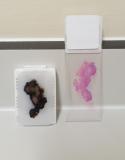Test Directory
TP53 mutation analysis
Containers - Adult

Red Cap Tube EDTA KE 2.7ml
|
Volume Range
2 x 2.7ml peripheral blood or bone marrow specimen
Additive per Container
EDTA |

FFPE block / H&E slide / Pathology report
|
|
Laboratory Site
RIE
51 Little France Crescent
Old Dalkeith Road
Edinburgh
EH16 4SA
Old Dalkeith Road
Edinburgh
EH16 4SA
Telephone: 0131 536 1000
WGH
Crewe Road South
Edinburgh
EH4 2XU
Edinburgh
EH4 2XU
Telephone: 0131 537 1000
Transport arrangements
Sample storage arrangements
Samples should be store at room temperature. See specimen requirements.
How to request
For Blood and Bone marrow samples:
please refer to our detailed requesting instructions. The HMDS request form can be located here.
Document
For FFPE samples:
Testing for NHS Lothian patients can be requested by email to molecular.pathoogy@nhslothian.scot.nhs.uk.
Referral requests must be accompanied by a completed request form.
Please also refer to our detailed requesting instructions.
Availability
Monday-Friday 9am-5pm
Anticipated turnaround
What happens if the result is positive or abnormal
Requesting clinician will be contacted via telephone or email. Please ensure details are included on request form.